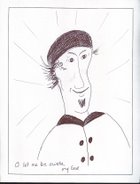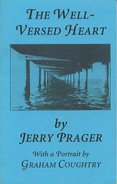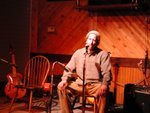Sun warmed May
The day clear, blue but
for trace clouds drifting; the river, beside me, shimmering,
soft breezes quiet. The
still surface slips downstream to the spillway;
wet poplar fluff sweeps
over. On the far bank
the old mortars of Little
Folk's walls
draw me back to the mix in
my boat.
The window seat of the Pub
shows flowering stands of plants on the bank below:
purples and
greens, gold and straw, serene with the reflection of the iron
bridge,
poplar fluff continues to
the spillway, to where the water falls in arcs of translucence, sprays of dusk, veils before the shadowed spruce and cedar
of the far, darkening bank.
Back to restoring the
river wall of the old Magic Mountain,
the water sounds the
spill, sluice and fall way, sounds the curvature of the cliffs
before the tooth of time;
modulates frequencies of water
ranging from effervescent
to boom.
Languid soundscape...
disturbed by bridge workers,
by diamond-blade, and
generated air.
There are agreements to be
kept, promises to be maintained.
Natural rights to defend.
Natural flaws to upend.
Work to be finished on the
wall of the former Magic Mountain.
July evening
The wind moves the water
like a mirage off the rental punt
docked on the village
boardwalk, the bow, a fulcrum to fanning surface
rippling reflections of
trees, stone walls and concrete embankments.
The Factory ruins are
mirrored and moving before their makeover
by the new lairds of the
mill, their takeover unfolding in due season,
like the slow pool
before the sudden rush into arcing waters and explosive spray,
mists
and light and wet before the remaining trees of the future condo
world
get manicured out of existence.
Another Evening in July
The Grand is out the
window, I, inside Ashanti writing languorous summer evening,
no trace of the wild river
of two springs before, when rains and warm-spell melt
filled the wetlands of the
upper tributaries with a gathering gravitas that drained down from
the plateau of Osprey headwaters, overflowed the Luther Marsh to Lake
Belwood, were delayed by the Shand Dam, raced the flats and ford
before Fergus then over its falls downstream to the Bissell spillway
and into the slipstream of Elora before hurtling down around the
gorge beyond the Tooth of Time.
Run-off creeks had flooded
meadows that spring; rains had filled the river outside the window
where I still feel the surging spring of two years before, back when
a tree trunk busted the concrete of the old spillway, after having
first broken the large,
orange buoy chain, strung
in front of between the old stone pillars that had once held
the span of the first true
bridge in Elora, the span that had become the pedestrian bridge,
after which it ceased to be a bridge, though the stone pillars still
stand in the river; abutted with a concrete prow to face the upriver
onslaught of hurtling trunks and branches, awaiting a new bridge, a
re-purposing by villagers or by new money.
Sitting here in the cafe,
I can't see where the water dropped beyond the Tooth of Time/Islet
Rock into the lower mill pool and pothole below, into the cauldron
of the deepest bowl
erupting water through the gorge, whirling torrent around
the karst faults and
caverns, replenished out of unseen limestone fissures and tunnels,
a roiling nuanced momentum
forced down the bed of the gorge, the tumbled, folded
and exploded run into, out
of and around outcrops and stone erosion waves...
the Grand again that
spring and the future
of what the new Lairds of
Elora have in mind for us... nagging ...
*** ***
***
The building needs more
work. The brick is soft above the foundation stone.
The history of the row of
stores and shops can be read on its riverside wall,
a portion of which I have
just repointed: the oddities of the organic growth of the row;
the gradual coming
together as a whole, each distinct building from the front,
has a time line read in
the actual sequence of stone work around back.
Idiosyncratic evidence,
proof of which walls came first,
are found in the rising
cornerstone lines of the buildings with worked corners,
revealing the rest as
infill between the nearest corner
and the down river corner
of the last building
by the public stairs from
the boardwalk to the street.
Down there, the river
pools pollution onto the small beach
below the village side
of the old pedestrian bridge,
the bridge now gone,
the original span across the Grand
for carts and horses,
removed years ago.
Bob
Robb says the sand of the river bank has a name: Ghetto Beach,
named for the
abandoned, termite-eaten apartments in front of the cinema
still known by some as
The Ghetto.
Elora's ghetto, Elora's
gorge, the divide between those who have and those don't.
On Ghetto Beach,
agricultural bloom decays with summer, a view that will be lost under
the replaced bridge, no matter who builds it, or its character: the
beach legends
will fade, and seasonal
blooms vanish below the under-surface of the future span.
October
Money acts upon the
landscape of the ancient karst,
begins with hammering
limestone as if it were solid rock and not
ancient eroded coral beds
bleeding water from the higher lands.
Money scraped away the
trees: the death of a minor forest,
a bit player of woods
dispatched in the second scene, not to be remembered,
not to be noticed, though
voices of protest gather within ionic clouds
around The Tooth of Time,
in memories of waters rising, forces growing
against the foundations of
private spans and vistas.
Causes mature; autumn
seasons a village receding water,
revealing designs of the
new Lairds of Islet Rock;
laying them bare before
the first snow falls
and the cold cash of
consequence freezes the future
like a postcard of Wedding
World bling and chi ching;
a
wish-you-were-here-in-Fauxlora-with-us kind of thing,
placed
in a shoebox and tied with a string.
The Grand River's people,
those who populate its banks, those who publish its agendas, those
who come and go and yet remain its people, all those who care and
can.
will
make a stand on The Tooth of Time, like its upriver prow, facing the
brunt.
Even
still, the river is rain on an ancient reef,
humanity
is poplar fluff drifting into the spray of a spillway.
Life
always overcomes, death is always reused.




